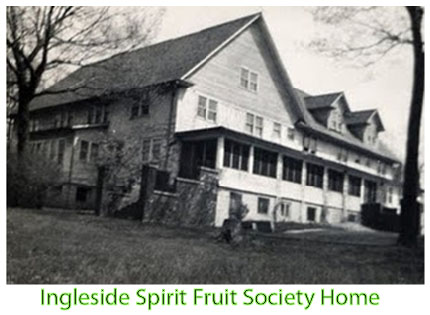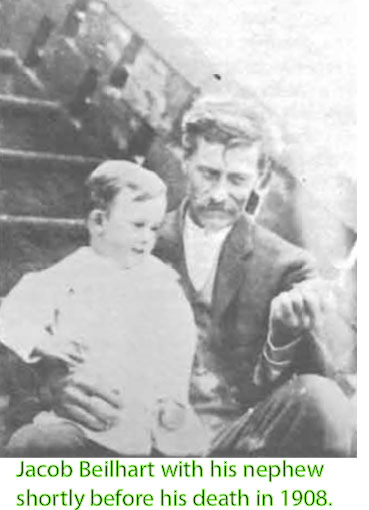The Fruit Society got its name for the founder Jacob Beilhart felt that mankind remained in a spiritual state akin to the bud or blossom, that man's soul had not yet achieved the spiritual perfection analogous to full fruition.

Jacob L Beilhart was born on March 4, 1867 in Ohio. When he was eighteen He moved to Kansas where he met his wife Olive Louema Blow whose family belonged to the Seventh Day Adventist. Both he and his wife attended school at Healdsburg in California. The curriculum of the school was based on Ellen Whites suggestions to cultivate intellectual facilities as well as moral and physical powers. Believing manual labor should be made part of a true education, the school taught carpentry, blacksmithing and similar disciplines.
After Healdsburg, Jacob and Louema moved to Battle Creek which was where Ellen White who with her husband James had founded the Seventh-Day Adventist Church and had a sanitarium run by Dr. John Harvey Kellogg. Jacob and Louema came to Battle Creek to study nursing. One of the patients Jacob helped nurse back to health was Charles W. Post who had requested his own private nurse.
Jacob would soon leave the Sanitarium and begin working with Post. Both men had retained much of what they learned at the Sanitarium and created the La Vita Inn partnership in direct competition to Dr. Kellogg. In 1896, Jacob and Louema had their second child Edith. Jacob soon realized C. W. Post was the father and confronted Post. Post offered Jacob fifty percent of the company to stay, but the Beilharts left Battle Creek for Ohio.

In Ohio, the Spirit Fruit Society was formed. They society was not perceived well by its neighbors and had to leave Ohio. On April 7,1906, the Spirit Fruit Society purchased from William J and Matthew J. Dalziel some ninety acres in Ingleside on Wooster Lake. There were concerns in Illinois also for another religious group had just formed in Zion City by their leader John Alexander Dowie.
Ingleside was found to be a desirable location for Jacob could spend time in Chicago and continue with his publications for the Society. The Fruit Society would as the Waukegan Sun would write build a magnificent building standing upon a knoll that commands an excellent view of Wooster Lake. The large basement would contain the printing establishment, as well as have room for several sleeping quarters. The dining room was large enough to seat 100 people. A photographic darkroom was included on the first floor. The Sun would also contrast the success of the Spirit Fruit Society to the troubled Zion City community.
With the newly built castle came the open house warming party to be help in conjunction with the annual outing of the Chicago Anthropological Society and would include numerous distinguished guests. The Chicago Tribune wrote that about fifty people came from Chicago on the St. Paul train to the house warming. At end of a hot ride, guest were given sparkling water from a tin pail. The Fruit Society felt if one needed a beer that one did not have to go to back door of the saloon. Beer they felt was not as harmful as hypocrisy. If person wishes to say "damn it" he does not deceive his neighbor by saying "darn it" or "O pshaw." The weakness of any person or nation is found in the number of laws they have made for themselves which they do not obey in spirit. A good government is one where there are few demands made. Everything travels along the path of least resistance. Man is no exception to this rule.

In addition to their daily routine of operating a large farm, the society would continue to host numerous visitors. In March and April of 1908, Jacob traveled to Chicago to give a series of speeches to the Anthropological Society. Jacob's last visit to Chicago was on November 19, 1908. He arrived home very ill and a doctor from Waukegan was summoned. It was determined that Jacob was suffering from an appendicitis from which he died on Tuesday November 24, 1908. Jacob was buried in a metal and glass coffin in an unmarked grave on the knoll overlooking Wooster Lake.
With Jacob's death, the publication of Spirit Fruit and Spirit's Voice ceased. Life at the farm continued, but the Society decided the northern Illinois climate was not suited for the faming they wished to do. Smitten with western fever, the Society put an ad in the Chicago Tribune January 16,1911 that told of the beautiful Illinois farm of 231 acres suitable for stock raising or as a sanitarium site. In the winter of 1914 the Society moved to California where it lasted until 1930.